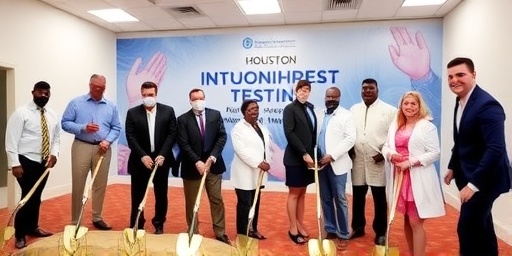In a bold move to safeguard public health, Houston officials broke ground on a cutting-edge infectious disease testing lab on Thursday, forging ahead with city-backed funding after a major CDC funding denial threatened to derail the project. The $120 million facility, set to become one of the largest in the Southwest, promises to dramatically enhance the region’s capacity to detect and respond to outbreaks, drawing cheers from health experts amid ongoing concerns over emerging pathogens.
- Groundbreaking Ceremony Spotlights Houston‘s Public Health Commitment
- Navigating CDC Grant Loss with Innovative City Financing
- Lab Design Promises BSL-3 Capabilities and Rapid Testing Innovation
- Addressing Houston’s History of Public Health Vulnerabilities
- Timeline Sets Stage for 2026 Full Operations and Broader Impact
Groundbreaking Ceremony Spotlights Houston‘s Public Health Commitment
The ceremony at the 20-acre site in Houston‘s East End industrial district was attended by Mayor John Whitmire, Health Department Director Dr. Ericka Lugo, and representatives from the Texas Department of State Health Services. Under clear skies, dignitaries wielded golden shovels to turn the first soil, symbolizing Houston’s resilience in the face of federal budget constraints.
“This lab isn’t just bricks and mortar—it’s a lifeline for our community,” Mayor Whitmire declared in his keynote address. “We’ve learned from COVID-19 that rapid testing saves lives, and Houston will never again be caught unprepared.” The event featured live demonstrations of portable testing kits and testimonials from frontline workers who battled the pandemic in under-equipped facilities.
Local business leaders also voiced support, with Houston Chamber of Commerce President Robert Lawson stating, “Investing in this testing lab secures our economic future by protecting our workforce from infectious disease threats.” The gathering underscored the project’s role in job creation, projecting 250 construction jobs and 150 permanent positions in lab operations, many targeted for Houston residents.
Navigating CDC Grant Loss with Innovative City Financing
The project hit a snag in late 2023 when the Centers for Disease Control and Prevention (CDC) rejected Houston’s $80 million grant application under its Public Health Emergency Preparedness program. Officials cited shifting national priorities toward rural areas and vaccine distribution infrastructure, leaving urban hubs like Houston to pivot.
Undeterred, the Houston City Council approved a multifaceted funding package in March 2024: $75 million from the city’s general fund, $30 million in bonds backed by hospital district revenues, and $15 million from philanthropic donations by the Texas Medical Center. “We refused to let bureaucracy stall progress,” explained Councilmember Amy Peck, who chaired the finance subcommittee. “This is taxpayer money well-spent on public health infrastructure that will serve generations.”
Financial transparency measures include quarterly audits by an independent firm and public dashboards tracking expenditures. Compared to similar facilities, Houston’s approach minimizes long-term debt, with bonds projected to be repaid in 15 years through efficiency savings in outbreak responses.
- Funding Breakdown:
- City General Fund: $75M
- Hospital District Bonds: $30M
- Private Donations: $15M
This self-reliant strategy has inspired nearby cities like San Antonio, which is now exploring similar local funding models for their own infectious disease initiatives.
Lab Design Promises BSL-3 Capabilities and Rapid Testing Innovation
Spanning 100,000 square feet, the new Houston testing lab will feature Biosafety Level 3 (BSL-3) suites capable of handling high-risk pathogens like tuberculosis, SARS-CoV-2 variants, and potential avian flu strains. Architects from Gensler, in collaboration with infectious disease specialists from Baylor College of Medicine, incorporated AI-driven automation for sample processing.
Key technical highlights include:
- High-Throughput Testing: Capacity for 20,000 samples per day, a tenfold increase over current Houston facilities.
- Genomic Sequencing Wing: Equipped with next-generation sequencers to track mutations in real-time.
- Mobile Response Units: Five deployable labs for field testing during surges.
- Bioinformatics Hub: Data center integrating with national surveillance networks like CDC’s BioSense.
Dr. Lugo highlighted the lab’s sustainability features: solar panels covering 40% of energy needs, water recycling systems, and LEED Gold certification. “This isn’t yesterday’s lab—it’s tomorrow’s fortress against infectious disease,” she said. Construction by general contractor Turner Construction is phased to allow early operation of core testing modules by mid-2025.
Addressing Houston’s History of Public Health Vulnerabilities
Houston‘s pursuit of this lab stems from hard lessons in vulnerability. During the 2020 COVID-19 peak, the city’s testing capacity lagged, with wait times exceeding 10 days and positivity rates hitting 25%. Hurricane Harvey in 2017 amplified risks, as floodwaters spread contaminants and delayed diagnostics.
Recent data paints a stark picture: Harris County reported 1,200 tuberculosis cases in 2023, the highest in Texas, alongside rising dengue fever incidents linked to international travel through Bush Intercontinental Airport. The lab will integrate with Houston’s 10 hospital systems, enabling surge capacity during events like the annual livestock shows, which have sparked past zoonotic outbreaks.
Experts like Dr. Peter Hotez from Baylor’s National School of Tropical Medicine praise the initiative: “Houston sits at the crossroads of global trade and migration, making it ground zero for emerging threats. This testing lab positions the city as a national leader in public health.” Partnerships with universities will also foster research, potentially yielding breakthroughs in multiplex testing for multiple pathogens simultaneously.
Community outreach has been robust, with town halls in underserved neighborhoods like Sunnyside and the Fifth Ward ensuring equitable access. Free testing drives and workforce training programs aim to build trust and local expertise.
Timeline Sets Stage for 2026 Full Operations and Broader Impact
Construction milestones include foundation completion by Q4 2024, structural framing by spring 2025, and equipment installation through 2026. Full operations are slated for July 2026, coinciding with the lab’s integration into the Gulf Coast Consortium for Infectious Diseases.
Looking ahead, the facility will enhance regional resilience by sharing data with Louisiana and Arkansas health departments, forming a tri-state rapid response network. Economically, it’s expected to attract $50 million in annual research grants, spurring biotech startups in Houston’s innovation corridor.
“This lab will save countless lives and billions in economic losses,” projected a Houston Health Department economic impact study, estimating averted costs from faster outbreak containment at $2.5 billion over the next decade. As federal CDC funding remains uncertain under budget reviews, Houston’s proactive stance offers a blueprint for other metros, signaling a new era where local ingenuity drives national public health security.
Stakeholders anticipate pilot testing programs to launch in early 2026, focusing on seasonal flu and mpox surveillance, with scalability for future pandemics. The project’s success could influence federal policy, prompting renewed CDC investments in urban preparedness.








